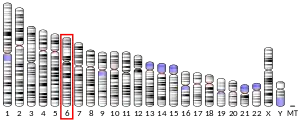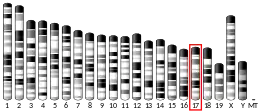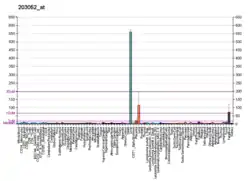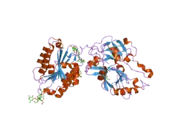Complement component 2
Complement C2 is a protein that in humans is encoded by the C2 gene.[5] The protein encoded by this gene is part of the classical pathway of the complement system, acting as a multi-domain serine protease. Deficiency of C2 has been associated with certain autoimmune diseases.[5]
| C2 | |||||||||||||||||||||||||||||||||||||||||||||||||||
|---|---|---|---|---|---|---|---|---|---|---|---|---|---|---|---|---|---|---|---|---|---|---|---|---|---|---|---|---|---|---|---|---|---|---|---|---|---|---|---|---|---|---|---|---|---|---|---|---|---|---|---|
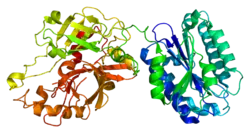 | |||||||||||||||||||||||||||||||||||||||||||||||||||
| |||||||||||||||||||||||||||||||||||||||||||||||||||
| Identifiers | |||||||||||||||||||||||||||||||||||||||||||||||||||
| Aliases | C2, ARMD14, CO2, complement component 2, complement C2 | ||||||||||||||||||||||||||||||||||||||||||||||||||
| External IDs | OMIM: 613927 MGI: 88226 HomoloGene: 45 GeneCards: C2 | ||||||||||||||||||||||||||||||||||||||||||||||||||
| |||||||||||||||||||||||||||||||||||||||||||||||||||
| |||||||||||||||||||||||||||||||||||||||||||||||||||
| |||||||||||||||||||||||||||||||||||||||||||||||||||
| |||||||||||||||||||||||||||||||||||||||||||||||||||
| |||||||||||||||||||||||||||||||||||||||||||||||||||
| Wikidata | |||||||||||||||||||||||||||||||||||||||||||||||||||
| |||||||||||||||||||||||||||||||||||||||||||||||||||
Function
In the classical and lectin pathways of complement activation, formation of the C3-convertase and C5-convertases requires binding of C2 to an activated surface-bound C4b in the presence of Mg2+; the resultant C4bC2 complex is cleaved by C1s or MASP2 into C2a and C2b. It is thought that cleavage of C2 by C1s, while bound to C4b, results in a conformational rotation of C2b whereas the released C2a fragment may retain most of its original structure.
C2b is the smallest , enzymatically active, fragment of C3 convertase in this pathway, C4b2b (NB: some sources now refer to the larger fragment of C2 as C2b, making the C3 convertase C4b2b, whereas older sources refer to the larger fragment of C2 as C2a, making the C3 convertase C4b2a). The smaller fragment, C2a (or C2b, depending on the source) is released into the fluid phase.[6]
References
- ENSG00000235017, ENSG00000235696, ENSG00000226560, ENSG00000204364, ENSG00000166278, ENSG00000231543 GRCh38: Ensembl release 89: ENSG00000206372, ENSG00000235017, ENSG00000235696, ENSG00000226560, ENSG00000204364, ENSG00000166278, ENSG00000231543 - Ensembl, May 2017
- GRCm38: Ensembl release 89: ENSMUSG00000024371 - Ensembl, May 2017
- "Human PubMed Reference:". National Center for Biotechnology Information, U.S. National Library of Medicine.
- "Mouse PubMed Reference:". National Center for Biotechnology Information, U.S. National Library of Medicine.
- "Entrez Gene: C2 complement component 2".
- Krishnan V, Xu Y, Macon K, Volanakis JE, Narayana SV (2009). "The structure of C2b, a fragment of complement component C2 produced during C3 convertase formation". Acta Crystallographica D. 65 (Pt 3): 266–274. doi:10.1107/S0907444909000389. PMC 2651757. PMID 19237749.
Further reading
- Bartholomew WR, Shanahan TC (1991). "Complement components and receptors: deficiencies and disease associations". Immunology Series. 52: 33–51. PMID 2091785.
- Campbell RD (Jan 1987). "The molecular genetics and polymorphism of C2 and factor B". British Medical Bulletin. 43 (1): 37–49. doi:10.1093/oxfordjournals.bmb.a072175. PMID 3315100.
- Yu CY (1999). "Molecular genetics of the human MHC complement gene cluster". Experimental and Clinical Immunogenetics. 15 (4): 213–230. doi:10.1159/000019075. PMID 10072631. S2CID 25061446.
- Lutsenko SM, Kharchenko VG, Bachurin VI, Lomakin MM (Feb 1976). "[Circulating blood volume and regional hemodynamics in acute gastrointestinal hemorrhage]". Sovetskaia Meditsina (2): 38–41. PMID 1084023.
- Zhu ZB, Hsieh SL, Bentley DR, Campbell RD, Volanakis JE (Jun 1992). "A variable number of tandem repeats locus within the human complement C2 gene is associated with a retroposon derived from a human endogenous retrovirus". The Journal of Experimental Medicine. 175 (6): 1783–1787. doi:10.1084/jem.175.6.1783. PMC 2119228. PMID 1350302.
- Lappin DF, Guc D, Hill A, McShane T, Whaley K (Jan 1992). "Effect of interferon-gamma on complement gene expression in different cell types". The Biochemical Journal. 281 (Pt 2): 437–442. doi:10.1042/bj2810437. PMC 1130704. PMID 1531292.
- Johnson CA, Densen P, Hurford RK, Colten HR, Wetsel RA (May 1992). "Type I human complement C2 deficiency. A 28-base pair gene deletion causes skipping of exon 6 during RNA splicing". The Journal of Biological Chemistry. 267 (13): 9347–9353. doi:10.1016/S0021-9258(19)50430-6. PMID 1577763.
- Lappin DF, Birnie GD, Whaley K (Nov 1990). "Interferon-mediated transcriptional and post-transcriptional modulation of complement gene expression in human monocytes". European Journal of Biochemistry. 194 (1): 177–184. doi:10.1111/j.1432-1033.1990.tb19443.x. PMID 1701385.
- Horiuchi T, Macon KJ, Kidd VJ, Volanakis JE (Mar 1989). "cDNA cloning and expression of human complement component C2". Journal of Immunology. 142 (6): 2105–2111. PMID 2493504.
- Cole FS, Whitehead AS, Auerbach HS, Lint T, Zeitz HJ, Kilbridge P, Colten HR (Jul 1985). "The molecular basis for genetic deficiency of the second component of human complement". The New England Journal of Medicine. 313 (1): 11–16. doi:10.1056/NEJM198507043130103. PMID 2582254.
- Bentley DR (Oct 1986). "Primary structure of human complement component C2. Homology to two unrelated protein families". The Biochemical Journal. 239 (2): 339–345. doi:10.1042/bj2390339. PMC 1147286. PMID 2949737.
- Bentley DR, Campbell RD, Cross SJ (1985). "DNA polymorphism of the C2 locus". Immunogenetics. 22 (4): 377–390. doi:10.1007/BF00430921. PMID 2997031. S2CID 11934813.
- Kam CM, McRae BJ, Harper JW, Niemann MA, Volanakis JE, Powers JC (Mar 1987). "Human complement proteins D, C2, and B. Active site mapping with peptide thioester substrates". The Journal of Biological Chemistry. 262 (8): 3444–3451. doi:10.1016/S0021-9258(18)61371-7. PMID 3546307.
- Wu LC, Morley BJ, Campbell RD (Jan 1987). "Cell-specific expression of the human complement protein factor B gene: evidence for the role of two distinct 5'-flanking elements". Cell. 48 (2): 331–342. doi:10.1016/0092-8674(87)90436-3. PMID 3643061. S2CID 32752642.
- Gagnon J (Sep 1984). "Structure and activation of complement components C2 and factor B". Philosophical Transactions of the Royal Society of London. Series B, Biological Sciences. 306 (1129): 301–309. Bibcode:1984RSPTB.306..301G. doi:10.1098/rstb.1984.0091. PMID 6149575.
- Bentley DR, Porter RR (Feb 1984). "Isolation of cDNA clones for human complement component C2". Proceedings of the National Academy of Sciences of the United States of America. 81 (4): 1212–1215. Bibcode:1984PNAS...81.1212B. doi:10.1073/pnas.81.4.1212. PMC 344796. PMID 6199794.
- Parkes C, Gagnon J, Kerr MA (Jul 1983). "The reaction of iodine and thiol-blocking reagents with human complement components C2 and factor B. Purification and N-terminal amino acid sequence of a peptide from C2a containing a free thiol group". The Biochemical Journal. 213 (1): 201–209. doi:10.1042/bj2130201. PMC 1152109. PMID 6555044.
- Kerr MA, Gagnon J (Jul 1982). "The purification and properties of the second component of guinea-pig complement". The Biochemical Journal. 205 (1): 59–67. doi:10.1042/bj2050059. PMC 1158446. PMID 6922702.
